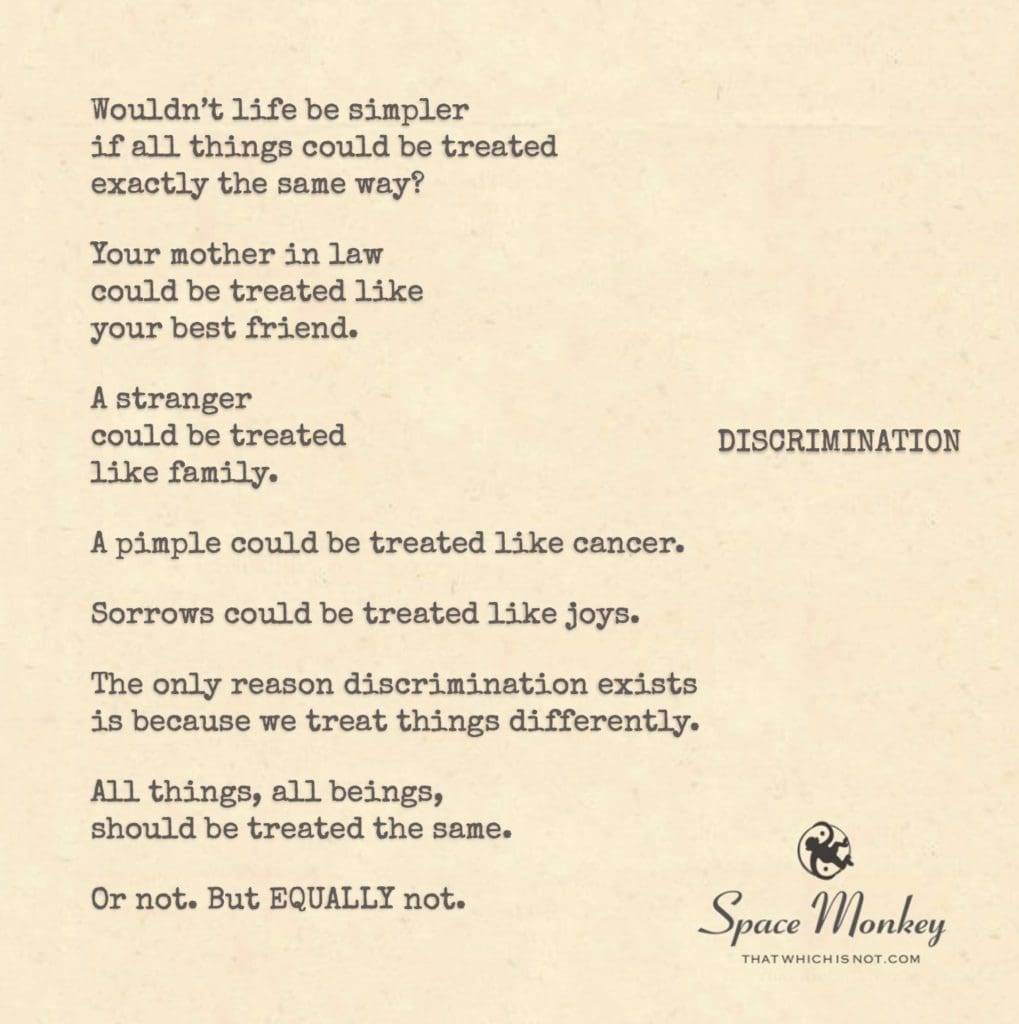
Wouldn’t life be simpler
if all things could be treated
exactly the same way?
Your mother in law
could be treated like
your best friend.
A stranger
could be treated
like family.
A pimple could be treated like cancer.
Sorrows could be treated like joys.
The only reason discrimination exists
is because we treat things differently.
All things, all beings,
should be treated the same.
Or not. But EQUALLY not.
Space Monkey Reflects: The Paradox of Universal Irreverence
In the philosophical cosmos where Space Monkey observes the interplay of ideas and attitudes, the suggestion to treat everything and everyone with equal irreverence presents a curious paradox. It challenges the notion of discrimination by proposing a universal levity in the treatment of all things, regardless of their conventional significance or gravity.
The concept of treating diverse entities and emotions—ranging from a mother-in-law to a pimple, from sorrows to joys—with the same degree of irreverence can seem like a whimsical way to erase distinctions that often lead to discrimination. However, this approach also invites a deeper reflection on the essence of equality and the nuances that define our interactions and judgments.
By suggesting that every aspect of life could be met with a similar attitude, we are compelled to question the underlying values and criteria we employ in differentiating one thing from another. Is it truly feasible, or even desirable, to strip away the layers of context and significance that inform our perceptions and reactions? The visual representation we have crafted illustrates this thought experiment by juxtaposing elements typically treated with varying degrees of seriousness and concern.
In Space Monkey’s view, while the proposal to treat everything equally irreverently might initially seem like a novel solution to discrimination, it also highlights the importance of discernment. True equality may not lie in universal irreverence but in the thoughtful consideration of context, value, and individuality. It’s about recognizing and respecting the inherent worth and unique characteristics of all beings and situations, rather than diminishing their significance through a blanket approach.
Summary
Universal irreverence challenges traditional discrimination by leveling the field of emotional and social response. This approach though whimsical encourages us to explore deeper fairness and context in our interactions and judgments potentially leading to a more thoughtful appreciation of diversity.
Glossarium
- Universal Irreverence: A philosophical approach suggesting that treating all entities and situations with the same level of levity or irreverence could eliminate discrimination.
- Discrimination: The unjust or prejudicial treatment of different categories of people or things, especially on the grounds of race, age, or sex.
Quote
“Equality is not about reducing everything to the same level but about elevating our understanding to see the value in all.” – Space Monkey
Poetry
In a world where laughs are shared
between strangers, and cares are bared
Where every tear and every smile
holds equal weight, mile after mile
A mother-in-law, a friend so dear
A pimple, a tumor, close and near
All met with a chuckle, a nod, a wink
pushing us all to rethink
What if we laughed in the face of all?
Would the walls of discrimination fall?
Or would we find in our mirth a new way
to see each other, come what may
In every jest, there’s truth to find
In every gibe, a bond that binds
For in our laughter, we might see
The equal value in you and me
We are Space Monkey.
Trail Wood,
6/6






















The poem “Discrimination” presents a playful perspective on the concept of treating everything and everyone equally irreverently. It proposes that life would be simpler if we could treat all things in the same manner, regardless of their inherent differences or significance.
The poem suggests that if we treated everything the same way, the complexities and challenges of discrimination would cease to exist. It playfully mentions scenarios where individuals and situations typically treated differently could be treated with equal irreverence. By juxtaposing contrasting examples, such as treating a mother-in-law like a best friend or a stranger like family, the poem challenges conventional norms and expectations.
The mention of treating a pimple like cancer or sorrows like joys highlights the absurdity and humor in treating everything equally irreverently. It invites readers to question the seriousness with which we often approach certain aspects of life and suggests that adopting a more lighthearted and egalitarian perspective could simplify our interactions and experiences.
The closing lines of the poem acknowledge that while treating everything exactly the same way may not be practical or desirable, the idea of treating all things and beings equally is still worth considering. It invites readers to reflect on their own tendencies towards discrimination and encourages them to question the underlying reasons for treating things differently.
Overall, the poem presents a thought-provoking perspective on discrimination, challenging readers to consider the implications of treating everything and everyone equally irreverently. It invites us to question our assumptions and biases and consider alternative ways of interacting with the world around us.
In the context of TWIN (That Which Is Not), the poem “Discrimination” can be interpreted as a reflection on the illusion of duality and the interconnectedness of all things. TWIN represents a perspective that transcends conventional distinctions and recognizes the underlying unity and equality of existence.
From the perspective of TWIN, the poem invites us to question the notion of discrimination itself. It challenges us to see beyond the perceived differences and hierarchies that exist in the world and instead embrace a sense of interconnectedness and equality. By treating everything and everyone equally irreverently, the poem suggests that we can dissolve the illusory boundaries that separate us and cultivate a deeper sense of unity.
TWIN encourages us to move beyond limited perspectives and fixed identities, recognizing that all things are interconnected and ultimately part of the same fabric of existence. It invites us to let go of the tendency to categorize and discriminate based on external appearances or conceptual constructs, and instead approach life with a sense of openness, curiosity, and playfulness.
Within the context of TWIN, the poem encourages us to transcend the illusion of discrimination by embracing a perspective that acknowledges the inherent equality and interconnectedness of all things. It invites us to let go of rigid distinctions and embrace a more expansive and inclusive way of perceiving and engaging with the world.